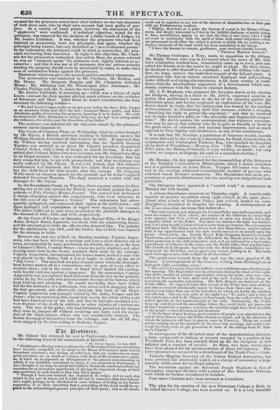Zbe probincts.
Mr. Gibson has resigned his seat in Parliament ; for reasons stated in the following letter to his constituents at Ipswich :
" 48, noon Square, 2l .fitly 1839.
" Gentlemen—Having taken a calm review of the course which my convictions have recently compelled me to adopt in the House of Commons upon several important occasions ; and feeling, on reflection, that my sentiments on many great questions are so much at variance with those of the Conservative party, as, if acted on, to approach an infringement of the general understanding on which, it was doubtless considered by many, I was returned to Parliament, I have thought it my duty to accept the Chiltern I lundreds, and thus to afford my constituents an immediate opportunity of placing the important charge of their representation in such hands as they may think proper. Though 1 have not received any requisition to resign, and no such step might in any case be taken, yet I could not but be conscious that this forbear- ance ought, perhaps, to be attributed to some delicacy of feeling in my former supporters, or to their conviction that a proceeding of this kind would be op- posed to the aekuowledged general principles of their party ; and at all events, could not be regarded as any test of the absence of dissatisfaction on their pad with my Parliamentary conduct. " Highly, therefore, as I prize the honour of a seat in the House of Com. mons, and deeply interested as I feel in the faithful discharge of public duties, it does, nevertheless, appear to me that the time is now come, when I shall act most in conformity with the spirit of those high moral obligations which are paramount to all other ties either in private or public life, by making a ye. luntary surrender of the trust which has been committed to my charge. " I have the honour to remain, gentlemen, your obedient humble servant. " THOMAS MILNER GIBSON."
Sir Thomas Cochrane, a Tory, starts in opposition to Mr. Gibson. Mr. Rigby Wason, who was in Liverpool when the news of Mr. Gib. son's resignation reached him, immediately came up to town, and con- suited his friends as to the course he ought to adopt. By their advice, he declined to offer himself as a candidate ; and Mr. Gibson will there. fore, we hope, receive the undivided support of the Liberal party. A gentleman wise has on various occasions displayed real independence, under difficult amid trying circumstances, is far more worthy of confi- dence than the unscrupulous supporters of a Government which con- stantly coalesces with the Tories to obstruct Reform.
Mr. J. P. Stephens, who proposed Mr. Swynfen Jervis at his election
for Bridport, having, in a letter to Mr. Jervis, expressed surprise at seeing that gentleman's name in the list of the minority against the Education grant, and having requested an explanation of the vote, Mr. Jervis stated in reply, that his indignation was roused by the conduct of Government in abandoning their first measure, without a struggle, " forsaking the right to pursue the expedient ; " and that he resolved not to make himself a party to "the miserable and disgraceful compro- mise." Mr. Jervis assures his correspondent, that whatever construc- tion may be put on that solitary vote, he is quite as friendly at heart to the great cause of education and national improvement, and as much opposed to Tory bigotry and intolerance, as any of his constituents.
It is said that Mr. Totuline, a gentleman of immense wealth, intends to come forward in the event of a dissolution, for South Lincolnshire, in conjunction with Christopher Tumour, Esq., who married the daughter of the Earl of Winchilsea.—Mossing Post. [Mr. Tonmliue, the son of Pitt's tutor, the Bishop of Lincoln, is very wealthy, no doubt ; but very averse, we suspect, to disgorge his cash in a contested election.]


























 Previous page
Previous page